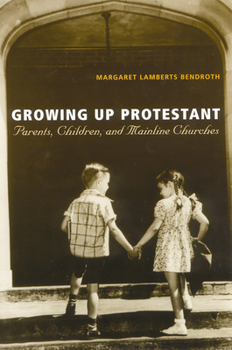Growing Up Protestant: Parents, Children and Mainline Churches
Home and family are key, yet relatively unexplored, dimensions of religion in the contemporary United States. American cultural lore is replete with images of saintly nineteenth-century American mothers and their children. During the twentieth century, however, the form and function of the American family have changed radically, and religious beliefs have evolved under the challenges of modernity. As these transformations took place, how did religion...
Format:Paperback
Language:English
ISBN:0813530148
ISBN13:9780813530147
Release Date:January 2002
Publisher:Rutgers University Press
Length:208 Pages
Weight:0.05 lbs.
Dimensions:0.5" x 6.5" x 8.6"
Customer Reviews
1 rating
Christianity but no Christ
Published by Thriftbooks.com User , 16 years ago
Margaret Bendroth attempts no small thing in Growing Up Protestant taking us through one hundred years of mainline Protestant family life. The church at the turn of the twentieth century was concerned with how the Christian life would be passed from one generation to the next. Not content with the simplicity of the 1920's method of using the family and a mother who was "naturally equipped to act as moral guides to children;" the church turned to the government in the 1930's. Trained professionals were now needed to teach the skills with which parents had once been entrusted. Soon after that, training became the government's responsibility. Joining with the U.S. Office of Civilian Defense in the 1940's, good church folk were issued stickers for car windows which proclaimed, "This Church Home is Cooperating in the United Christian Education Advance." On the back was a checklist of ways to be a good Christian. Looks were everything. If your family looked like it had fun together in a clean, neat setting you were a successful Christian family. Never mind that tedious biblical understanding; faith was pragmatic. By the 1960's "the cruelest realization...was the apparent failure of the 1950's style family religion to produce a new crop of adult church members." The emphasis on domestic issues faded and social action became the focus. By the 1990's it became clear that the church was simply a means to fulfill personal goals and if that could be achieved without the church then why attend? Seeking to vitalize the Christian family through professionals and government intervention, the Protestant church became impotent. Throughout the book there is a lot of Christianity and no Christ. The problem became obvious by the book's end; traditions and a good family life apart from Christ will not save.






